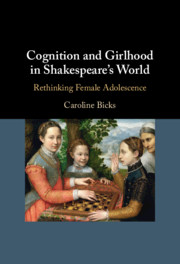Book contents
- Cognition and Girlhood in Shakespeare’s World
- Cognition and Girlhood in Shakespeare’s World
- Copyright page
- Dedication
- Contents
- Figures
- Acknowledgements
- Introduction
- Chapter 1 “A spectacle to men and angells”
- Chapter 2 “Imagination helps me”
- Chapter 3 “The progresse of an Art”
- Chapter 4 “If I should tell / My history”
- Chapter 5 “Put on the minde”
- Chapter 6 “From thirteene Yeares … resolved to serve God”
- Coda
- Notes
- Bibliography
- Index
Chapter 6 - “From thirteene Yeares … resolved to serve God”
Mary Ward’s Adolescent Brainwork
Published online by Cambridge University Press: 24 June 2021
- Cognition and Girlhood in Shakespeare’s World
- Cognition and Girlhood in Shakespeare’s World
- Copyright page
- Dedication
- Contents
- Figures
- Acknowledgements
- Introduction
- Chapter 1 “A spectacle to men and angells”
- Chapter 2 “Imagination helps me”
- Chapter 3 “The progresse of an Art”
- Chapter 4 “If I should tell / My history”
- Chapter 5 “Put on the minde”
- Chapter 6 “From thirteene Yeares … resolved to serve God”
- Coda
- Notes
- Bibliography
- Index
Summary
The final chapter considers the fixed, devotional brainwork that early modern writers attributed to Catholic English girls in particular who were training to serve God. By turning their body-minds toward a life of perpetual virginity, these girls might retain the cognitive gifts of adolescence indefinitely. In this way, they challenged early modern ideas about cold, mentally inert female adulthood as well as Protestant-inflected trajectories of female development that culminated in marriage. The chapter focuses on the seventeenth-century life writings and paintings that chronicle the teenage years of Mary Ward, the Catholic Englishwoman who founded over a dozen, unenclosed religious houses on the Continent based on the Jesuit’s apostolic mission, which included educating England’s recusant daughters — a process that included teaching them theatrical skills necessary for defending their faith back home. In her writings, written during her 30s, Ward is keenly aware of her adolescent mind’s ability to turn toward God with intention. Through her memorial reconstructions, she explicitly figures herself as occupying and owning the stage of girlhood that extended from puberty to marriage — using it to enact a particular kind of cultural memory about English Catholicism while projecting hopes for its future.
Keywords
- Type
- Chapter
- Information
- Cognition and Girlhood in Shakespeare's WorldRethinking Female Adolescence, pp. 190 - 221Publisher: Cambridge University PressPrint publication year: 2021

